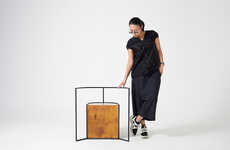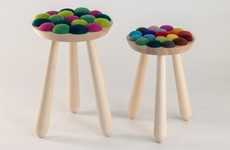
The Little Giant Chair by Signe Hytte is Inspired by the Japanese Culture
Meghan Young — March 29, 2013 — Art & Design
References: signehytte.dk & design-milk
The adorably named Little Giant Chair may appear to be a basic bare-boned design made purely with function over form in mind, but the addition of a versatile cushion changes that assumption instantly. Draping over one armrest, both or over the thin backrest, this cushion elevates the design to a cozy seat for both traditional and contemporary homes.
Designed by Signe Hytte, a recent graduate from the Danish design school TEKO, the Little Giant Chair was inspired by the Japanese culture. Warm and minimalist, the chair itself is made out of ash wood while the cushion is crafted out of wool. The "design itself is based on a tight and conceptual principle that stems from the Japanese Tatami patterns," as reported by Design Milk, which compelled Hytte to not hide its construction.
Designed by Signe Hytte, a recent graduate from the Danish design school TEKO, the Little Giant Chair was inspired by the Japanese culture. Warm and minimalist, the chair itself is made out of ash wood while the cushion is crafted out of wool. The "design itself is based on a tight and conceptual principle that stems from the Japanese Tatami patterns," as reported by Design Milk, which compelled Hytte to not hide its construction.
Trend Themes
1. Minimalist Seating - As consumers increasingly prioritize simplicity and functionality, innovation opportunities lie in creating seating designs that are both minimalistic and comfortable.
2. Versatile Cushions - With the rise of compact living spaces, there is an opportunity for innovators to create modular cushions that can be easily repositioned to adapt to different seating configurations.
3. Cultural Influence in Design - With globalization, there is a growing interest in incorporating cultural elements into modern designs, creating disruptive innovation opportunities that blend opposing elements.
Industry Implications
1. Furniture - The furniture industry can benefit from disruptive innovations that integrate versatile and modular designs to fit the changing needs of consumers and their living spaces.
2. Textiles - The market for textiles has potential for innovation in creating cushion materials that are both functional and aesthetically pleasing to match evolving design trends.
3. Interior Design - With an increasing focus on minimalism and functionality, innovative interior designers can create comfortable yet simple living spaces that eliminate clutter and provide a relaxing environment.
3.6
Score
Popularity
Activity
Freshness























